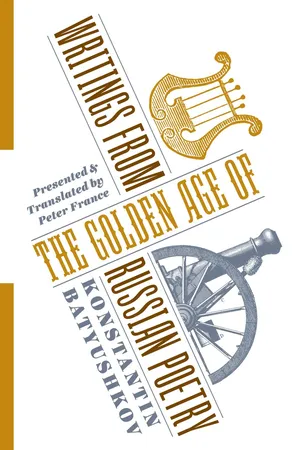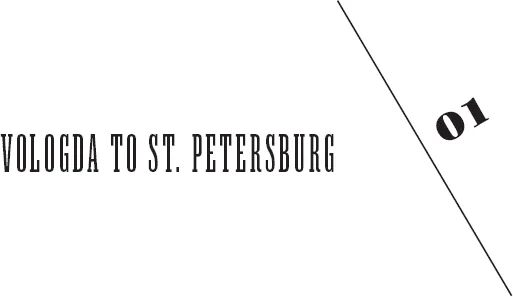![]()
Konstantin Nikolaevich Batyushkov was born in Vologda in northern Russia in May 1787 and died there in July 1855. This makes him a near-contemporary of Byron, Stendhal, and the composer Carl Maria von Weber; younger than the English Lake poets; older than Shelley, Leopardi, or Lamartine. As far as Russian poetry is concerned, he belonged to the generation following that of the great poet Gavrila Derzhavin (whom he praised as the “giant of Parnassus”)1 and the fable writer Ivan Krylov. With his friends Vasily Zhukovsky (four years his senior) and Pyotr Vyazemsky (five years his junior), he can be seen as an immediate forerunner of the great flowering of Russian poetry associated with the names of Aleksandr Pushkin, Evgeny Baratynsky, Anton Delvig, Nikolay Yazykov, and many more.
The prime of his life was the time when Russia was at war with the armies of Napoleon, and indeed Batyushkov might well have been a character in War and Peace. The first scene in Tolstoy’s novel takes place in July 1805 in a St. Petersburg salon such as the eighteen-year-old Konstantin frequented at that time. The world he knew was very much the world of the novel, a society held between the opposite poles of St. Petersburg and Moscow, and between city and country, but for several years turned topsy-turvy by foreign wars and invasion, a society where social success depended largely on family, patronage, and marriage. Like Prince Andrey and Nikolay Rostov, Batyushkov joined the fight against Napoleon, being wounded not at Austerlitz, but at the battle of Heilsberg, just before Friedland and Tilsit. Later he missed the battle of Borodino, but saw the smoking ruins of Moscow (like Pierre Bezukhov), then marched west in pursuit of Napoleon and entered Paris with the Russian army in 1814. In 1820, the date Tolstoy gives to his Epilogue, Batyushkov was coming to the end of his active life and showing signs of mental disturbance, but he lived on until 1855, by which time Tolstoy was approaching the age of thirty and thinking toward his great novel of the Napoleonic wars.
Batyushkov was born during the reign of Catherine the Great and died just after Tsar Nicholas I, but his most active years coincided with the reign of Nicholas’s elder brother, Alexander I, with whose army he marched into Paris. He encountered Alexander for the first time in 1813 and seems to have had mixed feelings about him. From the early nineteenth century, however, the young poet looked back with admiration to the greatest of the Romanovs, Peter the Great, who had made Russia, permanently if incompletely and controversially, a European nation with a European culture. Batyushkov was proud to belong to this renewed culture, singing Peter’s praises in a number of places. Thus, in a dialogue entitled “An Evening at Kantemir’s,” his protagonist, Prince Kantemir, the Russian poet and ambassador in Paris in the 1730s, explains to his French interlocutors how his once barbarous nation has been transformed:
You know what Peter did for Russia; he created people—no! he developed all the spiritual potential in them; he cured them of the disease of ignorance; and the Russians, under the guidance of a great man, proved in a short time that talents belong to the whole of humanity.
(Essays, 43)
Peter was not particularly interested in literature, but in creating a modern state. To do this, he needed an educated people, and he created institutions of learning that would transform the cultural life of the elite. And not just the elite: the Academy of Sciences of St. Petersburg, founded in 1724, subsequently the Imperial Academy, gave an education to the commoner Mikhailo Lomonosov, who became a prominent academician and the father of modern Russian literature (the University of Moscow bears his name today). In one of his essays, Batyushkov presents Lomonosov as the Peter the Great of Russian language and literature:
He achieved as much in the difficult sphere of literature as Peter the Great had in the sphere of politics. Peter the Great awakened a nation sleeping in the fetters of ignorance; he gave it laws, military power and fame. Lomonosov awakened the language of this sleeping people; he gave it eloquence and poetry, he tested its strength in every genre and prepared reliable means to success for future talents.
(Essays, 9)
Batyushkov and his friends were to be counted among these “future talents.”
If Russian literature was to take its place in the concert of European literatures, it had to learn from foreign examples, just as Peter had served his apprenticeship in the shipyards of Holland, bringing back to Russia foreign craftsmen and specialists of all kinds. Naturally, therefore, translation played a central role in the creation of Russian literary culture in the eighteenth and early nineteenth centuries. German writers and scientists were influential, but the dominant model was France. Paris was the cultural capital of Europe, French increasingly became the second language of educated Russians, and the Russian nobility began to travel to France. Kantemir, as we have seen, was at home in Paris in the 1730s; his satires are written in French-style syllabic verse, and were published in London in French translation. He was aiming to be the Russian Boileau, and many of his successors were seen as the Russian Racine, Molière, Voltaire, or La Fontaine.
By the second half of the eighteenth century, the enlightenment culture of France was epitomized in the figure of Voltaire, with his readable witty critique of existing abuses, superstition, and obscurantism; Voltaire and the philosophes were eagerly read in the new Russia by Batyushkov, among others. But France also offered models of salon poetry; by the end of the century, French poetry tended to mean above all light, galant verse—witty, erotic, and sentimental. Among the young Batyushkov’s models we find representatives of successive generations, Jean-Baptiste Gresset (1709–1777), Évariste de Parny (1753–1814), and Charles-Hubert Millevoye (1782–1816). All of these are largely forgotten today, but Parny in particular had a great reputation among the young Russian poets of the early nineteenth century. In one of her poems, Anna Akhmatova has the schoolboy Pushkin strolling outside his school, in the park of Tsarskoe Selo, with a “dog-eared copy of Parny.”2
Of course, by the time Pushkin was at school around 1812, France was not primarily the place of enlightenment and light verse. In the first place, it had become the land of revolution, to which the Russians, like other European peoples, reacted variously, ranging from enthusiasm to horror. Revolution was followed by foreign conquests under Napoleon; in Batyushkov’s eyes, as we shall see, the invasion of the Napoleonic armies and the destruction of Moscow meant that French enlightenment had given way to barbarism. In Russian literature more generally, the new century brought a change of models, with French enlightened classicism giving way to the romanticism of Northern Europe, which was made available to Russians by some major translations. In the first decade of the nineteenth century, Vasily Zhukovsky helped create a new poetry with his versions of Gray’s “Elegy” and German ballads. Even before this came the vogue for an imagined ancient Celtic culture generated by James Macpherson’s “translations” of Ossian. Kostrov’s complete Russian Ossian was published in 1792, and several of Batyushkov’s poems show him succumbing to the charm of the northern bard.
Vologda, where Batyushkov was born and died, is an ancient city of northern Russia. Situated some 200 miles to the north of Moscow, and some 250 miles to the east of St. Petersburg, it occupied a strategic position on the trading routes connecting Novgorod, Moscow, and Archangel. As a child, Batyushkov lived for several years on his grandfather’s estate at Danilovskoe, southwest of Vologda, and he later inherited from his mother the estate of Khantonovo, between Vologda and Novgorod. Between the ages of twenty and thirty-five, Batyushkov led a wandering life; his destiny carried him from place to place, both within Russia and abroad, to Germany, Finland, France, England, Sweden, Italy. In these years, Khantonovo was the country base to which straitened circumstances and inclination frequently forced him to return, and where he had the leisure to write.
In one of his essays, Batyushk...


